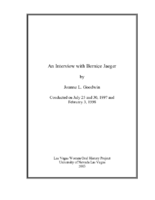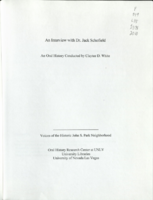Search the Special Collections and Archives Portal
Search Results

Transcript of interview with Bernice Jaeger by Joanne L. Goodwin on July 25, 1997, July 30, 1997, & February 3, 1998
Date
Archival Collection
Description
Interviewed by Joanne L. Goodwin. Bernice Smith was born in Cincinnati, Ohio, on July 27, 1934. She married Ivan Jaeger in 1955. He and his family were involved in the underground gaming industry in the Midwest. When it shut down in 1961, they moved to Las Vegas where Ivan worked first as a dealer and later in various executive gaming positions. Bernice was one of the fist students to attend Clark County Community College (later Community College of Southern Nevada) when it was founded in 1971. She earned a liberal arts degree in 1973 and a degree in hotel administration in 1974. Bernice worked as the secretary of Inez Rambeau, the director of convention sales at the Riviera Hotel and Casino. After a few years, she became the assistant of the hotel director at the Riviera. Later Bernice was the personal secretary to the owner and general manager of the Aladdin Hotel and Casino. She left that position in 1984, completed a bachelor's degree in the field of women's studies, and started Flex-Time, a temporary employment agency catering to working women. Then she was hired by Ira levy, the new owner of the Continental Hotel and Casino to be his assistant general manager. In 2003 Bernice earned a master's degree in counseling at the University of Nevada, Las Vegas, and she now works for Legal Rehabilitation Services, leading court-mandated group counseling for people in domestic violence situations
Text

Transcript of interview with Florence McClure by Joanne Goodwin, January 24, 1996 & February 6, 1996
Date
Archival Collection
Description
Florence McClure came to Las Vegas later in her life, but the state felt her presence and the community her contributions as if she were a native daughter. Introduced to the League of Women Voters in 1967, McClure met her political mentor Jean Ford and learned how to practice the core elements of democracy. She put those tools to work in a number of ways, however her participation in the creation of the Rape Crises Center and her advocacy for locating the women’s prison near Las Vegas are two of her long-lasting efforts. Florence Alberta Schilling was born in southern Illinois where she enjoyed the security of a tight-knit family and the independence to test her abilities growing up. She graduated from high school and attended the MacMurray College for Women at Jacksonville. With the attack on Pearl Harbor in 1941, she began a series of jobs working for the war effort. She moved to Ypsilanti, Michigan with a girlfriend to work at the Willow Run Army Airbase and then moved to Miami, Florida where she worked for the Provost Marshall in the Security and Intelligence Division. She met her husband, James McClure, at the time and they married in 1945. During the next several years, they raised a family and moved around the country and to Japan with the military. McClure came to Las Vegas in 1966 as part of her work in the hotel industry which she engaged in after her husband’s retirement from the military. She had worked in California and Miami Beach, but it was Burton Cohen in Los Angeles who invited her to join him in a move to Las Vegas to build the new Frontier Hotel and Casino. Following the completion of the Frontier, she moved to the Desert Inn with Cohen in 1967 and worked as the executive office manager. After a few years, she decided to leave the industry and complete her college education. She graduated from UNLV in 1971with a BA in Sociology with an emphasis on criminology. She was 50 years old. McClure had been a member of the League of Women Voters for a few years at that point and had learned the political process from Jean Ford and workshops on lobbying. She had numerous skills that were waiting to be tapped when she attended an informational meeting on the incidence of rape in the Las Vegas valley. From that meeting, a small group of individuals, including McClure, began the organization Community Action Against Rape (later renamed the Rape Crisis Center) in 1973. It was the first agency in the area devoted to serving individuals who had been assaulted and changing the laws on rape. The organization’s first office was set up in McClure’s home. Over the next decade, she worked to change attitudes and reshape policy by constantly raising the issues of sexual assault with police officers, emergency room doctors, judges, and legislators. Her role as an advocate took her into hospital emergency rooms and courtrooms to assist victims. It also took her to the state legislator to lobby repeatedly for a change in laws. During this period, journalist Jan Seagrave gave McClure the nickname “Hurricane Florence” - a fitting moniker that captured the force with which McClure attacked the issue. As a result of her efforts and those of the people with whom she worked, we now 1) recognize rape as a crime of assault; 2) forbid the sexual history of a rape victim from being used against her in court; and 3) recognize marital rape. In addition to learning about Florence McClure’s activities, the reader of this interview will gain information on the role of civic organizations like the League of Women Voters in engaging the voluntary efforts of women in the post-war years.
Text

Transcript of interview with Myra Berkovits by Barbara Tabach, August 21, 2014
Date
Archival Collection
Description
Interview with Myra Berkovits by Barbara Tabach on August 21, 2014. In this interview, Berkovits talks about growing up and starting her teaching career in Chicago. When she moves to Las Vegas, Berkovits eventually purchases a dining concierge business, but returned to teaching, and is now involved with the Sperling Kronberg Mack Holocaust Resource Center.
Myra Berkovits was born Myra Mosse in 1944 in Chicago, Illinois. She became an elementary school teacher in Chicago before moving to Las Vegas in 1980. Myra has made contributions to Las Vegas in the public and private sectors. She owned several businesses then returned to teaching, heading to the University of Nevada, Las Vegas (UNLV) to renew her teaching license and later received her master's degree. After a year of teaching in multicultural education, Myra was then in charge of the school district's homeless program, seeing its growth from serving 1,200 to 6,000 students. Myra's other passion was for Holocaust education and she became one of six interviewers in the city for the Shoah Foundation, documenting survivors' stories. One interviewee, David Berkovits, would later become her husband of fifteen years. Myra's own Holocaust education was aided by powerful trips to Israel and Poland. She used these experiences to develop and lead student-teacher conferences and classroom curriculum for the whole state. Myra still serves at the Education Specialist at the Holocaust Resource Center.
Text

Transcript of interviews with Al Levy by Cheryl Caples, February 23, 1979 and by Martha Zehnder, March 8, 1981
Date
Archival Collection
Description
Part I: Interview with Al Levy by Cheryl Caples on February 23, 1979. At the time of this interview, Levy was serving on the city commission (now the Las Vegas City Council). He talks about growing up in Las Vegas and attending Las Vegas Grammar School (Fifth Street School) and Las Vegas High School. He mentions the Helldorado events, recreational activities, and raising a family in Las Vegas. Part II: Interview with Al Levy by Martha Zehnder on March 8, 1981. Levy recalls much of the same information as the previous interview, and again talks about his schooling and attending the University of Southern California. He returned to Las Vegas to assist his father with his grocery stores. Levy talks about the polio epidemic as the reason that children were not allowed to swim at public or hotel pools. He discusses his real estate firm, Levy Realty Company, his involvement in the community and the Jaycees (Junior Chamber of Commerce), and the booming hotel industry. Levy also discusses some city leaders he's known, including Mayor Gragson. He talks about his Jewish faith and having to go to Los Angeles to train for his bar mitzvah because there were no rabbis living in Las Vegas.
Text

Transcript of interview with Andrew and Debbie Levy by Barbara Tabach, September 12, 2016
Date
Archival Collection
Description
Andrew (Drew) Levy was born and raised in Las Vegas, Nevada, where his family became prominent civic and real estate leaders. His grandfather was Harry Levy, a former Las Vegas City Commissioner, and his father Alvin Levy was a former councilman. Drew is always proud to say that he never left Las Vegas and of partnering with his father in the Levy Realty Company. While growing up, Drew it was easy for a teenager to enjoy the perks that could accompany his family?s civic persona?such as casino shows, events and meeting early Las Vegas casino executives like Moe Dalitz. After graduation from Clark High School, Drew attended Arizona State University. It was in Tempe that he met Debbie Cheek, his future wife. When Debbie arrived in Las Vegas, she enrolled at the University of Nevada, Las Vegas, where she finished her degree and started her accounting practice. She ran her business for ten years before opening Art Starts Here, an art school. In the 1990s, Debbie?s passion for art led her to be involved in the creation of First Friday, a local monthly art festival. She also teaches a summer art camp for the Adelson Educational Campus. Drew and Debbie became deeply involved in the many Jewish congregations in Las Vegas. Blossoming first at Temple Beth Sholom where they were married in 1980, Debbie sat on the preschool board and oversaw the temple board, while Drew was the advisor for the youth group. The couple later joined Congregation Ner Tamid where Drew was congregation president from 1999 to 2000 and Debbie was board treasurer in 2001. Debbie includes stories of her conversion to Judaism and keeping kosher. In this interview, Drew and Debbie Levy reflect on changes they see in Las Vegas, from when Drew was a kid to the times they raised their own daughters, Sarah and Jenna, here. Looking at the larger picture of the city, they describe booms in the real estate market and growth in the artistic and cultural aspects of Las Vegas. They provide a perspective of the growth of the local Jewish community.
Text

Transcript of interview with Judith L. Hamblin by Margaret Stambro, March 30, 1976
Date
Archival Collection
Description
On March 30, 1976, collector Margaret Stambro interviewed schoolteacher and registered medical stenographer, Judith L. Hamblin (born June 11, 1941 in Las Vegas, Nevada) in her home in Henderson, Nevada. This interview covers the history of Henderson, local schools and teachers, and Helldorado. Also during this interview, Mrs. Hamblin discusses her fondness for Lake Mead, the Basic Magnesium Plant, Nellis Air Force Base, and the early aboveground atomic blasts.
Text

Transcript of interview with Vivian Harwell by Pamela Atkins, February 27, 1979
Date
Description
On February 27th, 1979, Pamela Atkins interviewed Vivian Harwell in Las Vegas, Nevada. Harwell begins the interview by explaining her reasons for moving to Las Vegas from Arkansas, and the type of living quarters that she had. She then goes on to talk about the recreation in Las Vegas in addition to the Nevada Test Site and local politics. The two later discuss the convenience of having local colleges available in Las Vegas and the availability of children’s activities in Las Vegas. The interview concludes with Harwell’s personal reflection on her time living in Las Vegas, and that she does not regret moving to Las Vegas.
Text

Transcript of interview with Earl A. Evans by Lance Malone, March 15, 1981
Date
Archival Collection
Description
On March 15, 1981 Lance Malone interviewed Sears Roebuck Division Manager, Earl A. Evans, Jr., (born March 3rd, 1935 in Alhambra, California) in Las Vegas, Nevada. This interview covers the history of Nevada and Mr. Evans’s life. During the interview, Mr. Evans discusses education, sports, employment, the weather and the railroad in Las Vegas. He also discusses transportation, recreation, community involvement, raising a family in Las Vegas, the development of Fremont and the Strip, and religious activities. Mr. Evans served as a Bishop for the LDS Church in Las Vegas and in regards to education, he served on the Clark County School Board.
Text

Transcript of interview with Kerin Scianna Rodgers by Dennis McBride, February 24, 1998
Date
Archival Collection
Description
Kerin Rodgers owned a retail fashion store and modeling agency with a friend in Santa Monica, California. She came to Las Vegas in 1966 to work at The Broadway department store. She bought a home in the John S. Park Neighborhood in 1974. Popular radio personality; active in local and national politics.
Text

Transcript of interview with Dr. Jack Lund Schofield by Suzanne Becker, January 13, 2009
Date
Archival Collection
Description
In the dusty border town of Douglas, Arizona, Dr. Jack Lund Schofield was born in the family home in 1923. Due to the economic woes of the Great Depression, the Schofield family moved several times until 1937—the year that Jack's father took a position as a tungsten broker and moved his family of five children to Nevada. For Jack, who was ready to start high school, the move from Phoenix to Las Vegas with a small population of 5000 was a shock. However, it did not take the gregarious Jack long to make friends at Las Vegas High School. He played sports and was a Golden Glove boxing champion. As Jack's high school years drew to an end, two major events occurred: he met his future wife and World War II began. He proudly highlights his service as a fighter pilot in both WWII and the Korea conflict, his family genealogy, and his devotion to being an excellent educator, businessman, family man, and politician. In 1995, he earned his doctorate in education at the age of 72. His resume includes being an elected official, serving on the Board of Regents and having a middle school named after him. Jack and his wife, Alene, have resided in the John S. Park Neighborhood for over 50 years and describes his affection for the neighborhood and some of the changes that have occurred.
Text
